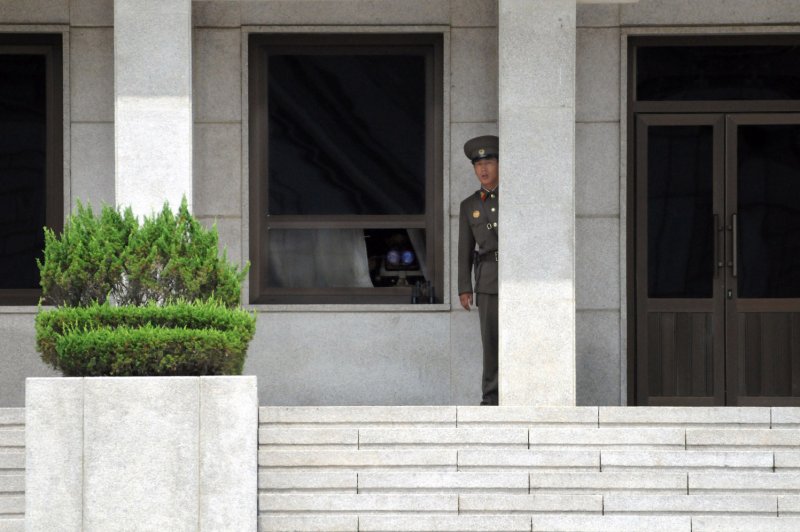A North Korean soldier stands watch on the North Korean side of the Demilitarized Zone seen from Panmunjom, South Korea. On the 67th anniversary of a South Korean massacre, Pyongyang called for unification. Photo by Spike Call/U.S. Navy |
License Photo
SEOUL, April 3 (UPI) -- North Korea's state-controlled media called for South Koreans to stand in solidarity with Pyongyang on the 67th anniversary of a civilian massacre that took place in South Korea two years prior to the Korean War.
The reclusive regime's Rodong Sinmun praised those who died during the Jeju Uprising of April 3, 1948, and urged the South Korean people to "hold in their hearts the deeds of Jeju insurgents."
Jeju is an island province located off the southern coast of the Korean peninsula.
South Korean news agency Yonhap reported North Korea also denounced U.S. "imperial rule" and called for a revolt against the United States in South Korea.
Pyongyang used strong rhetoric in order to claim the possible installation of a THAAD defense system, the joint military exercises between South Korea and the United States and the construction of a U.S. naval base on Jeju Island show South Korea remains "colonized" by foreign powers.
The Jeju Uprising was a tragic incident that culminated in the massacre of more than 14,000 people, some of whom were anti-Seoul insurgents but most were innocent civilians, including women and children.
South Korea's then-president Syngman Rhee cracked down on an insurrection staged by rebels opposed to U.S. military occupation. But the government response quickly escalated into violence when anti-communist youth groups began to engage in indiscriminate killings against locals, committing rapes and slaughtering children.
In South Korea, however, the memory of the uprising is still mired in controversy. South Korean conservatives believe communist insurgents are ultimately responsible for the bloodshed in Jeju.
South Korean President Park Geun-hye did not attend the Friday ceremony that paid respects to massacre victims, but Prime Minister Lee Wan-koo did take part to offer condolences.
South Korean newspaper Kyunghyang Sinmun said this is not the first time Park has strategically declined to attend the annual observance. In 2013, a tense standoff between North and South Korea prevented Park from attending, and a presidential trip to Europe overlapped with the ceremony in 2014.
The South Korean prime minister said at the ceremony Seoul honors the victims and that his government will do its best to support surviving family members.















